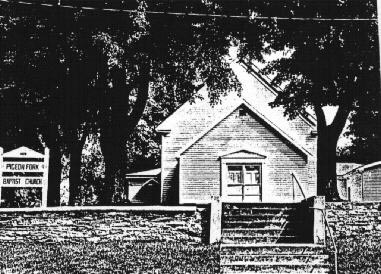
Location
from the Shelby County Cemetery Book: “From
Waddy, KY, drive east on KY 637 for 2.4 miles to its intersection with KY
1472. Travel south on KY 1472 for
1.2 miles. The church is on the
left side of the highway. Since
the center of 1472 forms the boundary at this point between Shelby
and Anderson counties, the church and cemetery are a few feet inside Anderson
County.”
The
Church was established in 1825 and rebuilt in 1904. The first Sunday School rooms were added 1939-40.
More Sunday School rooms and a vestibule were added later.
The cemetery was still being used in 1978 and an addition was opened
across the road on the north side of the old cemetery.
Pigeon Fork Baptist Church is a member of the Shelby Baptist
Association (Southern Baptist).
A.C.
COOK AND THE PIGEON FORK BAPTIST CHURCH
The first
thing most folks want to know about Pigeon Fork is the reason for it's unusual
name. Upon adopting a
Constitution, a Covenant and the Rules of Decorum on 12 March 1825, the
constituting members designated the Church "Pigeon Fork of Benson".
This referred to its location on the Pigeon Fork of Benson Creek and
distinguished the body from other churches,1 notably the South
Benson Church.
The
association of our Cook family with Pigeon Fork Baptist Church spanned three
generations. It began when Abraham C. and Sally (Cook) Cook moved a few miles
south of the Six Mile area in Shelby County, Kentucky to a place then called
Connersville. In February, 1847 the little town became incorporated and
changed its name to Harrisonville, by which it is still known today.
A. Cook was
received by letter at the regular second Saturday meeting of the church in
March of 1846.2 Considering
that Sally's father was the well-known preacher, Abraham Cook, who had founded
several churches in the vicinity, it is not surprising that Abraham C. Cook
was quick to take an active role at Pigeon Fork.
At the second
Saturday meeting in July, 1846, A.C. was appointed one of six messengers to
Middle District Association. In
September, and again in October, Brother A. Cook was appointed moderator. He
was sent to advise J.S. Major of his call as pastor in January of 1847.
In July the church decided to build a new meeting house and A.C. was a
member of the building committee.
In December
of that year however, occurred the first of a series of events which paint our
ancestor as a strong- willed and out-spoken man whose opinions did not always
sit well with others. "Brother J. Brooks complains that brother A. Cook
has hurt his feelings and refuses to give him satisfaction. The church agrees to take up the case..." The following
month it was reported that the difficulty had been amicably settled and the
investigating committee was dismissed. A
second "difficulty", this time between A. Cook and P. Jacobs arose
in early 1850 and was similarly settled.
Abram's
continued active involvement in varied and numerous positions is documented
throughout the next twenty years of church minutes and in the diary of Brother
Hungerford, who was pastor at Pigeon Fork for almost a dozen years in the
1860s and 70s.
In 1870, the
church was much occupied with providing housing and upkeep for one Sister Ann
Booth. A.C. was charged with
finding lodging for her. He
apparently did so with his son, Henry B. Cook, since the church was assessed
fifteen dollars to pay H.B. Cook for boarding Sister Ann Booth.
It is not
clear whether the missionary efforts on behalf of Sister Booth was the spark
that ignited tempers, but in October Brother A.C. was asked to attend the next
meeting to make explanation of the language he had used against Brother
Hungerford at the preceding September meeting.
They must have been powerful words!
The following month a resolution was passed "that Brother A.C.
Cook be expelled from the fellowship of the Church for discourteous language
used against the pastor of this church for which he refuses to make an
apology."
A.C. and
Sally lived another two decades within walking distance of the Pigeon Fork
meeting house, but the name of A.C. Cook was never mentioned again in the
minutes of the Church.
Pat
Sengstock, 2nd great-granddaughter
May, 1997
Submitted by
Chas. L. Cook , great-grandson - Cookstuff@aol.com
1.
"Pigeon Fork Baptist Church Shelby County, Kentucky, Sesquicentennial
Anniversary 1825-1975", pamphlet, 1973 Historical Committee of Pigeon
Fork Baptist Church, page 2
2.
"Minutes of Pigeon Fork Baptist Church", The Church of Latter Day
Saints, microfilm 0986464
Lineage:
Abraham C. Cook (1809-1893), William Cook III (Abt. 1764-1816),
William Cook II (Abt. 1725-Abt.1784), William Cook I (Abt. 1700-Unknown).
Sally Cook, (Sarah
Catherine Cook, wife 1810-1890),
Rev. Abraham Cook (1774-1854), William Cook II (Abt. 1725-Abt. 1784), William
Cook I (Abt. 1700-Unknown).
Abraham
Cook, (Rev. 1774-1854), William Cook II (Abt. 1725-Abt. 1784),
William Cook I (Abt. 1700-Unknown).
Henry B. Cook (1836-1905), Abraham C. Cook (1809-1893), William Cook
III (Abt. 1764-1816), William Cook II (Abt. 1725-Abt 1784), William Cook I (Abt.
1700-Unknown).
